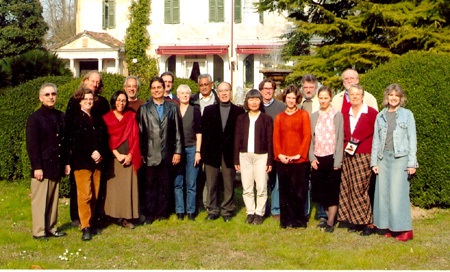World Anthropologies: Disciplinary Transformations within Systems of Power
Date
Mar 7-13, 2003Organized by
Arturo Escobar and Gustavo Lins RibeiroLocation
Hotel Villa Luppis, Pordenone, ItalyPublications
World Anthropologies: Disciplinary Transformations within Systems of Power (Gustavo Lins Ribeiro and Arturo Escobar, Eds.), Berg, Oxford, 2006.Participants
- Eduardo P. Archetti University of Oslo, Norway
- Eeva Berglund Independent Scholar, UK
- Marisol de la Cadena University of California, Davis, USA
- Arturo Escobar University of North Carolina, USA
- Johannes Fabian University of Amsterdam, The Netherlands
- Richard Fox Wenner-Gren Foundation, USA
- Esteban Krotz Universidad Autónoma de Yucatán, Mexico
- Susana Narotzky Universitat de Barcelona, Spain
- Paul Nchoji Nkwi University of Yaoundé, Cameroon, contributed paper
- Michal Osterweil University of North Carolina, USA
- Gustavo Lins Ribeiro Universidad de Brasilia, Brazil
- Josephine Smart University of Calgary, Canada
- Verena Stolcke Universidad Autónoma de Barcelona, Spain
- Sandy Toussaint University of Western Australia
- Nikolai Vakhtin European University, Russia
- Otávio Velho National Museum, Brazil
- Shiv Visvanathan Center for the Study of Developing Societies, India
- Shinji Yamashita University of Tokyo, Japan
ORGANIZER’S STATEMENT: Our symposium met with a two-fold goal in mind: a) to examine critically the international dissemination of anthropology –as a changing set of discourses and practices– within and across national power fields; b) to contribute to the development of a plural landscape of world anthropologies that is both less shaped by metropolitan hegemonies and more open to the heteroglossic potential of unfolding globalization processes. More specifically, “World Anthropologies” aimed at pluralizing the prevailing views of anthropology where the hegemony of Anglo-Saxon discourses on difference prevails. It stemmed from the realization that, in an age of heightened globalization, anthropologists have failed to discuss consistently the current nature of their practice and its mutations on a global scale. The Symposium was an opportunity to trigger a conversation among anthropologists from many regions of the world in order to assess the diversity of relations between regional or national anthropologies and a contested, power-laden, disciplinary discourse. “World Anthropologies” aimed at contributing to the articulation of a diversified anthropology that is more aware of the social, epistemological, and political conditions of its own production.
These issues were explored through fourteen papers grouped under the following themes: Anthropology and Transnationalism, intended to explore the mutations effected in anthropologies by the transnational conditions of contemporary practice (papers by Fabian, Krotz, Smart, and de la Cadena); Power and Hegemony in Anthropology, focused on the contradictions and tensions between hegemonic anthropologies and different national, regional, or minority anthropological knowledge (Dávila, Archetti, Velho); Truth and Politics, devoted to discussing the social and epistemological bases on which anthropologists make claims to truth that have political consequences (Narotzky, Nkwi and Berglund); and Anthropology Today, which examined the relations between anthropology, the nation-state, and empire, past and present, as well as the relations between the locations of anthropological subjects and the development of particular anthropological practices, including the national and supra-national networks in which particular traditions have been enmeshed (Yamashita, Vakhtin, Toussaint, Vishvanathan). These four sessions were complemented by two afternoon debates, one devoted to small group discussions (under the themes of Colonialism, Nationalism, Imperialism: Contexts and Predicaments for World Anthropologies?; Eurocentrism and World Anthropologies. Epistemological Tensions or Hegemony?; and Power and Practices within Institutional, National and International Scenarios and the Future of World Anthropologies), plus a concluding discussion under the rubric of New Exchanges and Possibilities in World Anthropologies, led by the symposium’s discussant, Verena Stolcke.
While the above themes give an idea of the kinds of debate we had over the days of the symposium, they do no justice to the richness of the actual discussions. Our debates ranged from very specific re-interpretations of particular national histories to constructive restatement of long-standing questions, such as “what is anthropology really about, and who is for?” Along the way, we were lead to discard several of the working concepts with which we arrived at Villa Luppis (e.g., the existence of a shared world-wide matrix of concepts and practices), question others (e.g., hegemony, or any sort of dichotomy, such as center and periphery), and introduce yet others (e.g., multiple centrisms; or the multiplicity of times, livelihoods and epistemologies as the basis for world anthropologies, in contrast to the foundational assumption of evolutionary linear time). As participants raised questions such as, “Is there any ‘truly national’ anthropology?” and “Are national anthropologies necessarily nationalist?”; or even more intractable ones, such as “Is a unitary view of history necessary to discuss the history of anthropology/ies?” a much more complex view of our subject matter progressively emerged. As a result, while we corroborated our belief that a “World Anthropologies” project is indeed emerging, we came away from the symposium with the strong, and tremendously exciting, awareness that the task of giving form to this project is just beginning.
Wenner-Gren Symposium #131
